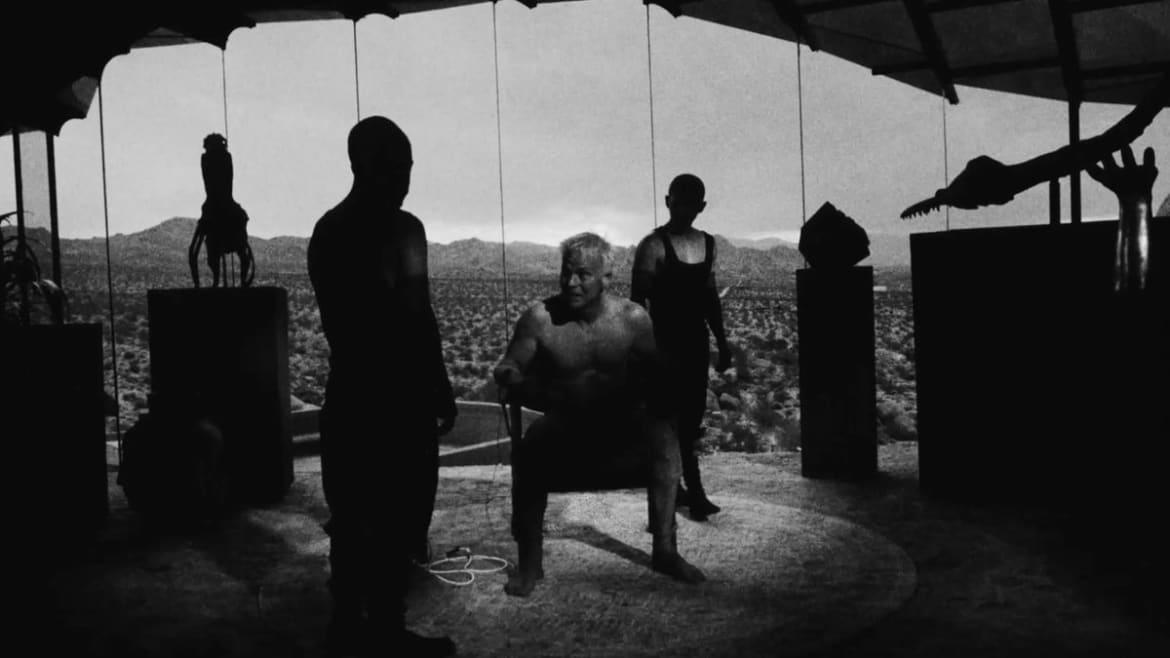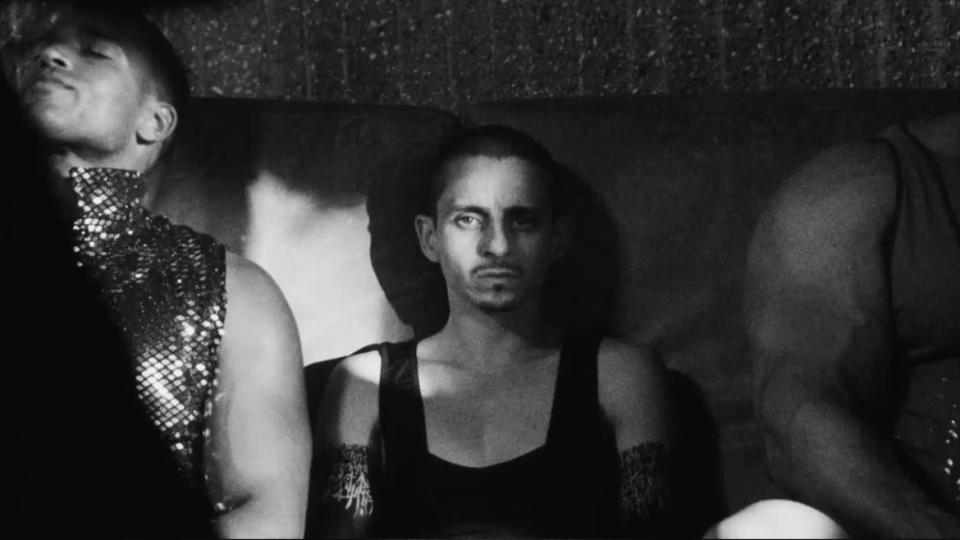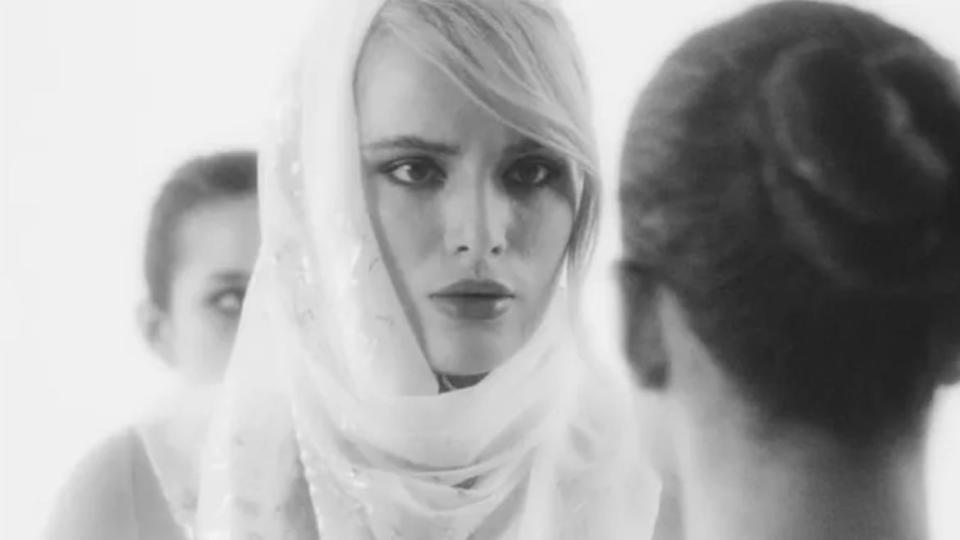Sci-Fi Thriller ‘Divinity’ Stuns With Horror, Wonders, and Weirdness

- Oops!Something went wrong.Please try again later.
Divinity begins with close-ups of what appears to be an alien womb pulsating and expanding in the darkness and a narrow vaginal light shining brightly and opening wide to reveal, ultimately, a camera’s lens. It’s a striking image of creation and cinema, the two commingled to elicit both terror and awe. “The dream is… to live forever,” intones the scientist, Sterling Pierce (Scott Bakula), reflected in that lens, and his fantasy is at the heart of Eddie Alcazar’s sterling directorial debut—a boldly demented science fiction saga (executive-produced by Steven Soderbergh) that melds the unsettling body horror of David Cronenberg and the seductive surrealism of David Lynch with a menacing video game-inflected spirit of its own.
A standout at January’s Sundance Film Festival, Divinity (in theaters Oct. 13) straddles the line between the old and the new—a fitting scenario for a film about the chasm between morality and eternity. Shot on grainy black-and-white 16mm and scored to ominously electronic compositions by Cyprus Hill’s DJ Muggs and Dean Hurley, Alcazar’s maiden feature is set in an unspecified future time and place on an Earth whose population has been radically transformed by Divinity, an elixir that allows users to live forever.
This civilization-altering concoction was initially envisioned and researched by Sterling, and fully realized—upon the pioneer’s untimely death—by his son Jaxxon Pierce (Stephen Dorff), a blond-haired scion whom Dorff inhabits as a greedy businessman with severe daddy issues. Wielding a big, bright smile that repulses rather than invites, Dorff’s inventor is, from first sight, an untrustworthy huckster, and nothing that follows dispels that unflattering impression.
Jaxxon is introduced peddling his miracle supplement (dispensed via droppers from translucent bottles) in commercials populated by sexy models and the enormously buff physique of Jaxxon’s perfectly named brother Rip (Michael O'Hearn), a goliath who resembles—and whose later outfits will suggest is akin to—a Greek god. The quest for perpetual youth is one rooted in sex, flesh, and hunger, and those notions all freely blend in Divinity, whose story comes to involve hedonistic erotic trysts, voracious animalistic feasts (of birds and phallic bananas) and inflated bodies that are pulverized into goo. Whether through intermittently spied television advertisements or its action proper, the film is a swirling monochromatic dreamscape of carnal pleasures, all of them warped by unchecked desire.

Divinity imagines tomorrow as a retro fantasyland of amazing old-school technology: analog tapes, cathode-ray television sets, and 1950s laboratory equipment (which sometimes recalls Mayan temples) are all part of its throwback aesthetic. Its tale is by and large set in Jaxxon’s desert home, a sprawling palace of dim shadows, fanged and ribbed structures, and corporeal sculptures that’s been designed to look like the inside of a great beast. To this remote abode come two unnamed brothers (Moises Arias and Jason Genao) who seem to have arrived in this desolate region from heavenly parts unknown. Silently, they infiltrate Jaxxon’s lair and, upon discovering him in flagrante delicto with a model, zap him into submission and tie him to a chair. Then, they give him a constant IV infusion of pure, undiluted Divinity, much to his panicked displeasure.
Stephen Dorff Wants More Than Marvel’s ‘Worthless Garbage’
The extraterrestrial siblings’ purpose remains vague throughout Divinity, as are many other key details. Alcazar’s script is more about intimation and mood than about explicit explanations; it operates on an intuitive as much as a literal level. That’s especially true with regards to Ziva (Bella Thorne), the leader of a group of body-suited women who stand as the last vestiges of fertility on a planet whose people no longer can—or need to—biologically reproduce. Ziva exists in some negative-space plane where she preaches to her acolytes about their mission, which has to do with finding and recruiting other females capable of giving birth. By the end of the film, their eyes will turn toward Nikita (Karrueche Tran), a prostitute who shows up at Jaxxon’s house and mistakenly assumes that she’s been hired by the brothers, who in short order get a lesson from her about pleasure, romance, and the emotional and logistical intricacies of threesomes.
Nikita’s presence in Jaxxon’s mansion leads to complications not only for the alien brothers—given that she soon falls for one of them, thereby alienating the other—but for Jaxxon himself, who’s slowly being turned by his potion into a swollen-headed mutant. The more Jaxxon metamorphosizes into a marauding beast and, thus, the literal embodiment of his invention’s monstrousness, the more he spirals out of control, plagued by smeary funhouse-mirror hallucinations of his father chastising him for perverting his idealistic plans for Divinity. Late revelations about the source of Jaxxon’s Divinity power imply a subtle critique of stem-cell research for curative health remedies. Yet Alcazar does little to unduly burden his madness with politics; his prime fascinations are muscle and fluid, the physical and the intangible.

Divinity’s destiny is violence, and when it materializes, it does so with Ray Harryhausen-inspired stop-motion flair courtesy of a Street Fighter 2-style battle between Arias’ visitor and a hulking Jaxxon. Alcazar freely synthesizes the modern and the classical to create something strangely transfixing, providing (with cinematographer Danny Hiele) a bevy of unreal panoramas marked by stark silhouettes, smoky gloom, and twinkling-star nightscapes. At a concise 88 minutes, the film’s atmosphere takes priority over its plotting, at times to its detriment; there are instances when a bit more action is coveted. Nonetheless, it casts a foreboding spell, its electric form turning it into a phantasmagoric journey into deep, primal recesses.
Led by a charismatic Dorff as a tycoon whose ambitions are tied up in his craving for the paternal approval he’ll never receive, as well as Arias as the more commanding half of the spacemen duo intent on overturning Divinity’s new world order, Divinity hums with malevolence. Its wonders are also its horrors, and it straddles that line with aplomb, all the way to a final shot that manages to sneak some overt humor into the sinister proceedings. It may be a calling card venture for Alcazar, but it’s an impressive one, and portends potentially big, and chillingly unhinged, things for his own cinematic future.
Liked this review? Sign up to get our weekly See Skip newsletter every Tuesday and find out what new shows and movies are worth watching, and which aren’t.
Get the Daily Beast's biggest scoops and scandals delivered right to your inbox. Sign up now.
Stay informed and gain unlimited access to the Daily Beast's unmatched reporting. Subscribe now.

